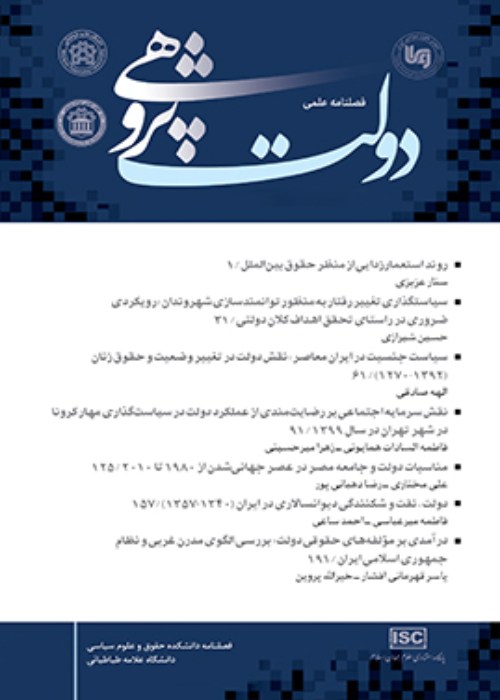State-Favored Identity Construction: An Islamic Identity in the Stories of Kanoon-e Parvaresh-e Fekri-e Koodakan Va Nojavanan
Author(s):
Abstract:
Purpose
Identity is a kind of self-understanding in relation to others that is accompanied by judgment and feeling. This concept is of a high importance in social life since it allows people to stand out as a member of the society, especially since we live in a society where concepts of self have an impact on our relations with others. Identity is not natural and is constructed socially and historically. Alternatively, identity construction is an integral component of social life. This article aims to describe the relationship between politics, narrative and identity through explaining how the state is the managing construction of identity. As a case for studying such a relationship, the article explains how the Islamic government in Iran manages identity construction through policy-making regarding the publication of stories for teenagers. Moreover, the purpose of this article is to answer a question about constructing an Islamic identity (as a favorite identity for the state and as a mechanism for social control) through stories for teenagers. Thus, the article aims to analyze the content of over 280 stories published by the state-owned institution of Kanoon-e Parvaresh-e Fekri-e Koodakan Va Nojavanan (hereafter referred to as Kanoon).Design/Methodology/Approach: Theoretically, this analysis is based upon Stuart Halls Representation Theory as well as the cultural studies approach. The representation theory explains how culture (as a complex of systems and subsystems of meanings) is being historically reproduced and cultural studies revolves around the interconnectedness of society, politics, identity and culture. Methodologically, documentary analysis was utilized as a data collection method. Through this method, the researcher investigated the archive of Kanoon, including 285 storybooks for gathering the available data. All the data was collected from titles, cover photos and cover introduction summary of the books. Afterwards, content analysis was used for data analysis.
Findings: First of all, analyzing the collected data lead the researcher to the conclusion that constructing an Islamic identity can be realized through accompanying or pairing signs of Muslimhood (or being Muslim) and goodness (or being good) in stories published by Kanoon for teenagers. This pairing can be realized in three levels or units. In other words, the story title, cover photos and cover summaries of every book included pairing signs of being a Muslim and being good (as being acknowledged, beautiful, kind etc). More than 21 percent of all stories that Kanoon has published for teenagers during three decades are instances of such identity construction. During a time span of 30 years (from 1360 to 1390), Kanoon published 285 story books for teenagers, 61 of which contain signs of being a Muslim and being good. But this pairing was realized differently in the units of analysis: 31 title, 34 cover photos and 41 cover summaries contain pairing signs of being a Muslim and being good. As a result, Kanoon can be considered as a platform for identity construction.
Originality/Value: Such findings show the capability of representation theory and demonstrate how one can utilize theoretical and methodological properties of cultural studies. Due to the importance of narrative in the construction of teenagers identity, the findings of this research have theoretical and practical value. Although there are valuable articles and books on the relationship between politics, identity, narrative and the state, this relationship in the Islamic Republic of Iran has not been the subject of a study.
Keywords:
Language:
Persian
Published:
Studies the State, Volume:2 Issue: 6, 2016
Pages:
1 to 38
magiran.com/p1591116
دانلود و مطالعه متن این مقاله با یکی از روشهای زیر امکان پذیر است:
اشتراک شخصی
با عضویت و پرداخت آنلاین حق اشتراک یکساله به مبلغ 1,390,000ريال میتوانید 70 عنوان مطلب دانلود کنید!
اشتراک سازمانی
به کتابخانه دانشگاه یا محل کار خود پیشنهاد کنید تا اشتراک سازمانی این پایگاه را برای دسترسی نامحدود همه کاربران به متن مطالب تهیه نمایند!
توجه!
- حق عضویت دریافتی صرف حمایت از نشریات عضو و نگهداری، تکمیل و توسعه مگیران میشود.
- پرداخت حق اشتراک و دانلود مقالات اجازه بازنشر آن در سایر رسانههای چاپی و دیجیتال را به کاربر نمیدهد.
In order to view content subscription is required
Personal subscription
Subscribe magiran.com for 70 € euros via PayPal and download 70 articles during a year.
Organization subscription
Please contact us to subscribe your university or library for unlimited access!


